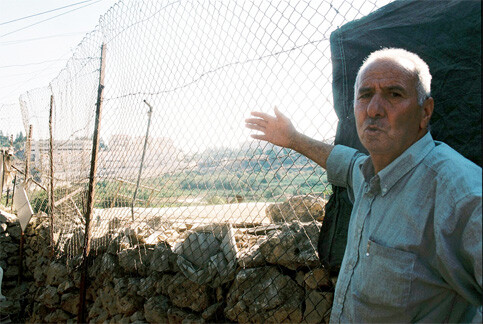The Electronic Intifada 11 August 2008

Sami Gheit, a 62-year-old farmer, said he was promised adequate access to the land, but this was not granted. (Shabtai Gold/IRIN)
HEBRON (IRIN) - The toughest part of the West Bank just got a bit sweeter, with an influx of beehives, helping farmers cope with the decline in their economic situation.
Stuck between two Israeli settlements, the Palestinian residents of Wadi al-Ghrous in Hebron are surrounded by military bases and fences, their movements are restricted, and over the past 25 years they have been affected by Israeli land expropriations.
Sami Gheit, a 62-year-old farmer, said he lost 50 dunams (five hectares) of his land to a “buffer zone” created by the Israeli military between his home and the nearby settlement of Qiryat Arba. However, the fence surrounds the Palestinians and not the settlements, thereby annexing, de facto, Gheit’s land, the farmer said.
“I had grapes, plums, apricots, almonds on the other side of the fence,” he told IRIN. “They took it away about five years ago. They said it was for security.”
He said he was promised adequate access to the land, but this was not granted.
“I used to just prune my trees for a month and a half every year. Now I get two days access in total,” Gheit said. “This is not enough to get any work done.”
He and others tried to gain access to the land but he said they were met by armed settlers who turned them away and since then he has become despondent about trying again.
The Israeli military told IRIN the fence was erected due to security needs in the tense area. The military could not explain why settlers and not soldiers were given authority over the fence.
The Israeli Civil Administration said it worked to help coordinate the access of Palestinians and that the latter had recently told the authorities they were satisfied.
“In the last six months not a single request by residents to access their land in the area was denied,” Miki Golan, a spokesman, said.
ICRC handouts
Not being able to sell his fruits meant his financial condition deteriorated and Gheit now depends on handouts from the International Committee of the Red Cross (ICRC).
“They took away my income when they took my land,” he said.
The ICRC gave him five beehives to help him get back on his feet.
“I got the beehives about five months ago and this is the first batch,” he said holding up a jar of honey. “I spend my time with the bees. I have no land but I have something,” he said.
The ICRC said it gave five beehives each to 74 West Bank families.
“This is a contribution to helping people be self sufficient,” Katharina Ritz, deputy head of the ICRC in Jerusalem, told IRIN. “They are in a very vulnerable position because they have lost access to their land, have little access to water, or have lost their job.”
No movement restrictions for bees
For Samir Jaber, another Palestinian farmer in the enclave, the proximity to the settlement has a small irony: because the settlers have abundant access to water they are able to grow many flowers which his bees use for gathering nectar.
“There are lots of rosemary bushes in the settlements and this is good for the honey,” Jaber said. “In the winter, I want to plant my own rosemary.”
Jaber complains bitterly about the Palestinians’ water crisis.
“We have [had] lots of water problems in the last three years. It wiped us out,” he said, adding that because of the restrictions on movement it was hard to tanker in water. Refuse trucks and ambulances cannot access this area either.
Jaber said it takes him over an hour to reach his cousin’s house, about 200 meters away and visible from his window, because of an Israeli military base planted in the middle of what was the family’s land.
Water
But this summer, water was the main issue.
“We brought in an expert who found water underground. We would have to dig about 30 meters to get the water,” Jaber said. But digging wells requires a difficult-to-obtain permit from the Israeli authorities, and the farmer is not hopeful.
“If I had access to the water, I’d invest more in agriculture and give the rest of the water to my neighbors,” he said.
His neighbors opened up their cistern to show how it was going dry. “We have so many problems but the [settlers] have all the water they want,” the man muttered bitterly.
This item comes to you via IRIN, a UN humanitarian news and information service, but may not necessarily reflect the views of the United Nations or its agencies. All IRIN material may be reposted or reprinted free-of-charge; refer to the copyright page for conditions of use. IRIN is a project of the UN Office for the Coordination of Humanitarian Affairs.


